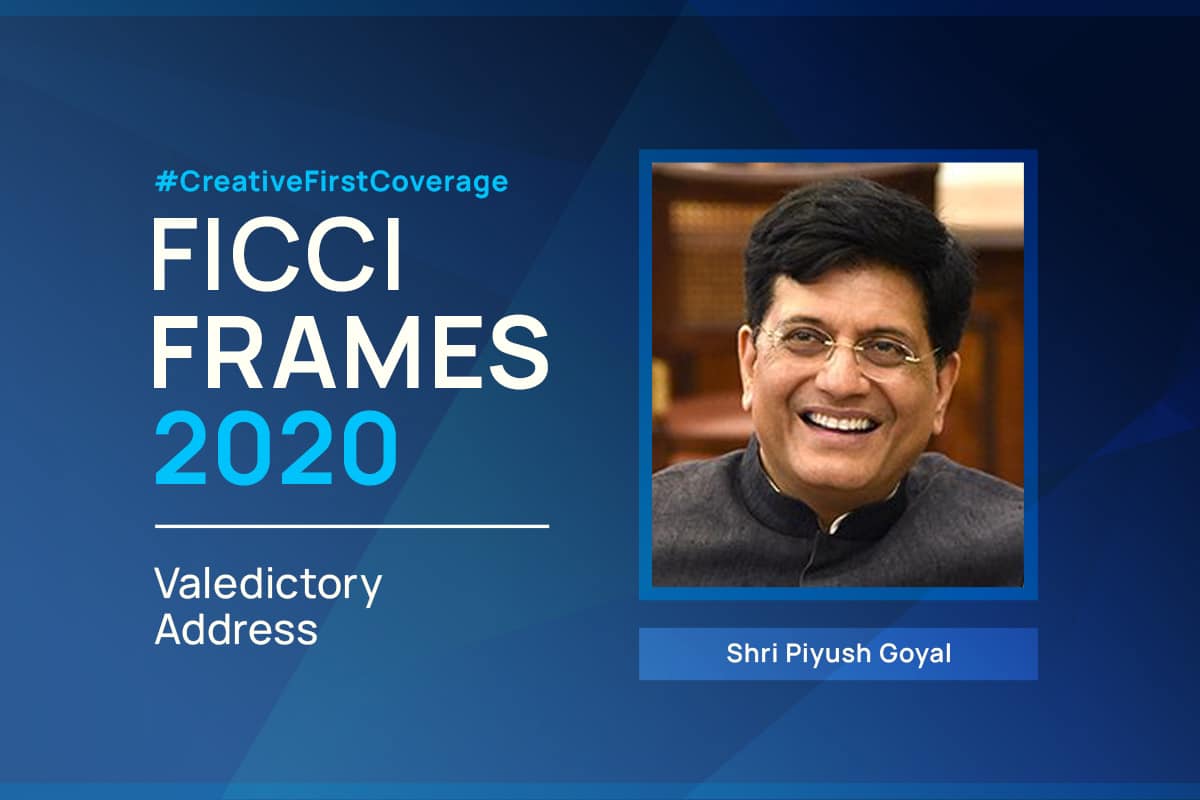
E-Frames 2020 concluded on July 11 with a valedictory address by Mr. Piyush Goyal, the Union Minister for Commerce and Railways. Opening the session, Ms. Sangita Reddy, President, FICCI, gave an overview of the rapid strides India’s media and entertainment sector has made in the last few years. She said that India produces the largest number of films in the world, has improved its gaming and animation capabilities, and that many international studios now use Indian talent. Siddharth Roy Kapur, President of the Producers Guild of India, said that these were strange times for the media and entertainment sector. He added that while, film and TV production has come to a halt, people’s appetite for entertainment has only grown. High viewership numbers on TV and OTT platforms are proof of this increase in consumption.
Mr. Kapur said that these “very tough times” required government support. “Our industry in India requires capital and while we understand that government can’t give us capital, it can help us get access to it,” he added. In the long run, Mr. Kapur said, that India’s screen density needed to increase. “At present there’s a lot of disparity. Some cities that oversaturated with movie halls and there’s a woefully inadequate number of screens in others. Government support to address this problem might herald a renaissance,” he added.
Mr. Kapur also spoke about issues of self-censorship on OTT platforms and easing the process of shooting films in India. He said that…
..OTT platforms gave content creators an opportunity to create web series and TV shows that were at par with global standards.
To ensure that such creativity flourished, he advocated for self-regulation by the industry, rather than a centralized regulator. Mr. Kapur added that to ease the process of shooting films in India, states should offer incentives to the industry and offer single window clearances. It’ll help boost tourism and popularize Indian destinations abroad, he added.
Mr. D Suresh Babu, a leading producer of Telugu films, agreed with Mr. Kapur and said it would be helpful if there was one ministry in each state and at the Centre that dealt with creative businesses.
World is now divided between before-Covid and after-Covid: Piyush Goyal
In his valedictory address, Mr. Goyal acknowledged that the media and entertainment industry was hit severely by the Covid-19 crisis. But, he added, that…
..this was also an opportunity for the sector to think out of the box, redesign frameworks of doing business and come up with new ways of filmmaking.
He gave the example of animated movies, and said that these have potential to do better than traditional films. Mr. Goyal also thanked the film industry for spreading awareness about the COVID-19 disease and the ways in which people can protect themselves. The time now, he said, is to move towards opening up and resuming business activities with all protective measures in place.
Mr. Goyal agreed that a lot more needed to be done to ease the process of shooting movies in India.
He urged FICCI to spearhead the process of creating a single form that could be sent to multiple agencies to grant film permissions and added that his ministry will facilitate the process.
Mr. Goyal also asked the industry to consider building an online platform that whistleblowers can use to highlight piracy. He added that the Ministry of Electronics and Information Technology (MeitY) can also help the industry to back such a venture. Other measures to curb piracy could include an increase in penalties and a tightening of existing rules.
On self-regulation of OTT platforms, Mr. Goyal said that he was in favour of creative freedom but it can’t be an excuse to portray India in poor light.
Mr. Goyal underlined that any self-regulation must ensure that the cultural ethos of the country is maintained.
Finally, Mr. Goyal urged the industry to consider providing a social security net to the people it employs. “There must be some effort to offer minimum wage, healthcare, pensions and insurance to the 26 lakh people who the industry works with, directly or indirectly. It would be useful to create a database of such people to ensure that everyone gets a fair wage,” he said.